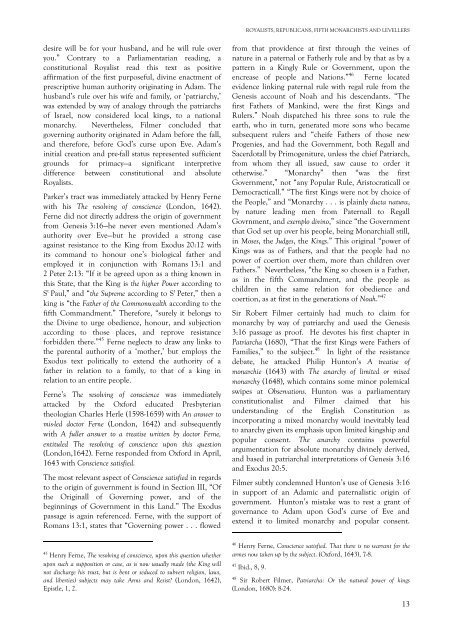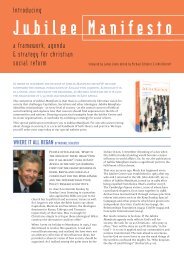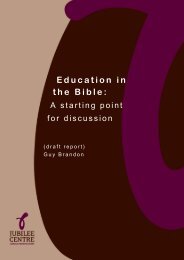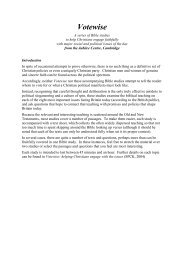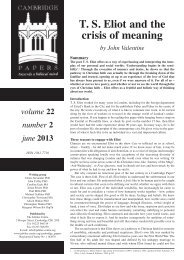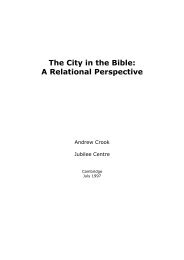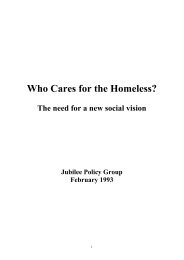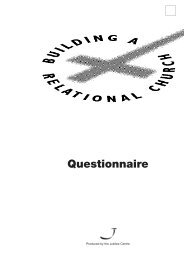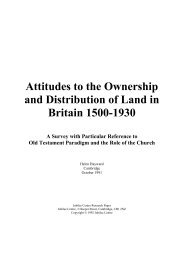Report Template - Jubilee Centre
Report Template - Jubilee Centre
Report Template - Jubilee Centre
You also want an ePaper? Increase the reach of your titles
YUMPU automatically turns print PDFs into web optimized ePapers that Google loves.
ROYALISTS, REPUBLICANS, FIFTH MONARCHISTS AND LEVELLERS<br />
desire will be for your husband, and he will rule over<br />
you.” Contrary to a Parliamentarian reading, a<br />
constitutional Royalist read this text as positive<br />
affirmation of the first purposeful, divine enactment of<br />
prescriptive human authority originating in Adam. The<br />
husband’s rule over his wife and family, or ‘patriarchy,’<br />
was extended by way of analogy through the patriarchs<br />
of Israel, now considered local kings, to a national<br />
monarchy. Nevertheless, Filmer concluded that<br />
governing authority originated in Adam before the fall,<br />
and therefore, before God’s curse upon Eve. Adam’s<br />
initial creation and pre-fall status represented sufficient<br />
grounds for primacy—a significant interpretive<br />
difference between constitutional and absolute<br />
Royalists.<br />
Parker’s tract was immediately attacked by Henry Ferne<br />
with his The resolving of conscience (London, 1642).<br />
Ferne did not directly address the origin of government<br />
from Genesis 3:16—he never even mentioned Adam’s<br />
authority over Eve—but he provided a strong case<br />
against resistance to the King from Exodus 20:12 with<br />
its command to honour one’s biological father and<br />
employed it in conjunction with Romans 13:1 and<br />
2 Peter 2:13: “If it be agreed upon as a thing known in<br />
this State, that the King is the higher Power according to<br />
S t Paul,” and “the Supreme according to S t Peter,” then a<br />
king is “the Father of the Commonwealth according to the<br />
fifth Commandment.” Therefore, “surely it belongs to<br />
the Divine to urge obedience, honour, and subjection<br />
according to those places, and reprove resistance<br />
forbidden there.” 45 Ferne neglects to draw any links to<br />
the parental authority of a ‘mother,’ but employs the<br />
Exodus text politically to extend the authority of a<br />
father in relation to a family, to that of a king in<br />
relation to an entire people.<br />
Ferne’s The resolving of conscience was immediately<br />
attacked by the Oxford educated Presbyterian<br />
theologian Charles Herle (1598-1659) with An answer to<br />
mis-led doctor Ferne (London, 1642) and subsequently<br />
with A fuller answer to a treatise written by doctor Ferne,<br />
entituled The resolving of conscience upon this question<br />
(London,1642). Ferne responded from Oxford in April,<br />
1643 with Conscience satisfied.<br />
The most relevant aspect of Conscience satisfied in regards<br />
to the origin of government is found in Section III, “Of<br />
the Originall of Governing power, and of the<br />
beginnings of Government in this Land.” The Exodus<br />
passage is again referenced. Ferne, with the support of<br />
Romans 13:1, states that “Governing power . . . flowed<br />
45<br />
Henry Ferne, The resolving of conscience, upon this question whether<br />
upon such a supposition or case, as is now usually made (the King will<br />
not discharge his trust, but is bent or seduced to subvert religion, laws,<br />
and liberties) subjects may take Arms and Resist? (London, 1642),<br />
Epistle, 1, 2.<br />
from that providence at first through the veines of<br />
nature in a paternal or Fatherly rule and by that as by a<br />
pattern in a Kingly Rule or Government, upon the<br />
encrease of people and Nations.” 46 Ferne located<br />
evidence linking paternal rule with regal rule from the<br />
Genesis account of Noah and his descendants. “The<br />
first Fathers of Mankind, were the first Kings and<br />
Rulers.” Noah dispatched his three sons to rule the<br />
earth, who in turn, generated more sons who became<br />
subsequent rulers and “cheife Fathers of those new<br />
Progenies, and had the Government, both Regall and<br />
Sacerdotall by Primogeniture, unless the chief Patriarch,<br />
from whom they all issued, saw cause to order it<br />
otherwise.” “Monarchy” then “was the first<br />
Government,” not “any Popular Rule, Aristocraticall or<br />
Democracticall.” “The first Kings were not by choice of<br />
the People,” and “Monarchy . . . is plainly ducta natura,<br />
by nature leading men from Paternall to Regall<br />
Govrnment, and exemplo divino,” since “the Government<br />
that God set up over his people, being Monarchiall still,<br />
in Moses, the Judges, the Kings.” This original “power of<br />
Kings was as of Fathers, and that the people had no<br />
power of coertion over them, more than children over<br />
Fathers.” Nevertheless, “the King so chosen is a Father,<br />
as in the fifth Commandment, and the people as<br />
children in the same relation for obedience and<br />
coertion, as at first in the generations of Noah.” 47<br />
Sir Robert Filmer certainly had much to claim for<br />
monarchy by way of patriarchy and used the Genesis<br />
3:16 passage as proof. He devotes his first chapter in<br />
Patriarcha (1680), “That the first Kings were Fathers of<br />
Families,” to the subject. 48 In light of the resistance<br />
debate, he attacked Philip Hunton’s A treatise of<br />
monarchie (1643) with The anarchy of limited or mixed<br />
monarchy (1648), which contains some minor polemical<br />
swipes at Observations. Hunton was a parliamentary<br />
constitutionalist and Filmer claimed that his<br />
understanding of the English Constitution as<br />
incorporating a mixed monarchy would inevitably lead<br />
to anarchy given its emphasis upon limited kingship and<br />
popular consent. The anarchy contains powerful<br />
argumentation for absolute monarchy divinely derived,<br />
and based in patriarchal interpretations of Genesis 3:16<br />
and Exodus 20:5.<br />
Filmer subtly condemned Hunton’s use of Genesis 3:16<br />
in support of an Adamic and paternalistic origin of<br />
government. Hunton’s mistake was to rest a grant of<br />
governance to Adam upon God’s curse of Eve and<br />
extend it to limited monarchy and popular consent.<br />
46<br />
Henry Ferne, Conscience satisfied. That there is no warrant for the<br />
armes now taken up by the subject. (Oxford, 1643), 7-8.<br />
47<br />
Ibid., 8, 9.<br />
48<br />
Sir Robert Filmer, Patriarcha: Or the natural power of kings<br />
(London, 1680): 8-24.<br />
13


